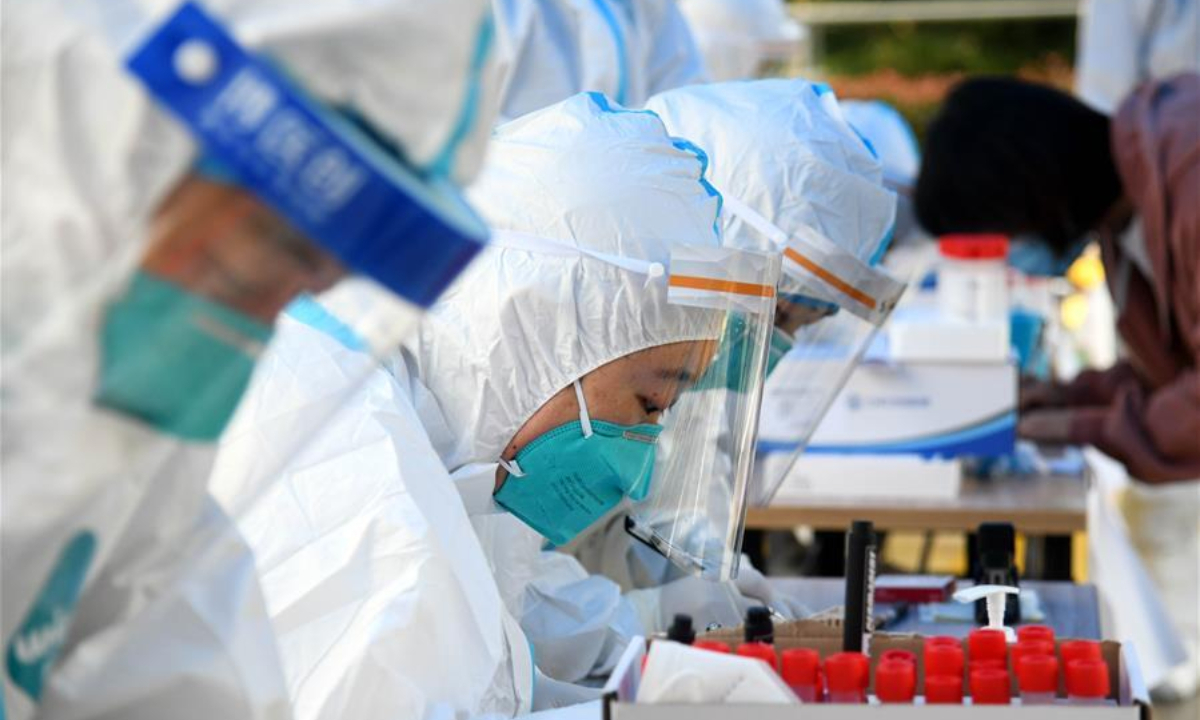
Medical staff wait to collect swab samples from residents for COVID-19 test in Qingdao, east China's Shandong Province, Oct. 14, 2020. Photo:Xinhua
Some areas of China where there have not been confirmed COVID-19 cases for a certain period have eased nucleic acid testing requirements to reduce the impact of anti-epidemic measures on people's daily life .
Chinese experts view the updates as an effort by local governments to balance economic recovery and epidemic control, but at the same time they warned of the risk of delayed reactions to potential outbreaks, as officials from the Chinese National Health Commission (NHC) noted that the risk of virus transmission still exists in some places. For example, Beijing and Shanghai are still combating the Omicron variant.
In Dezhou, East China's Shandong Province, since Wednesday residents no longer need to provide negative nucleic acid test results to enter cinemas or theaters.
The Dezhou authorities also removed limitations on eat-in and commercial events as well as conferences. The authorities noted that the adjustments are based on the local epidemic situation in order to reach a balance between epidemic prevention and stimulating the vitality of the market and unleashing consumption potential.
Hai'an in East China's Jiangsu Province announced on June 12 that the city would suspend nucleic acid testing in local districts, but would continue to provide normal nucleic acid testing services.
Since May 21, Hai'an has conducted random nucleic acid testing in local districts every two weeks. On June 10, the city collected 35,000 samples and all were negative.
The Tongzhouwan Demonstration Zone in Nantong city in Jiangsu also announced a suspension of random nucleic acid testing from June 14 after a round of screening the day before that produced all negative results.
In addition, some places in Huangshan and Xuancheng in East China's Anhui and Huizhou in South China's Guangdong Province also announced an easing of local nucleic acid testing policies based on the current epidemic situation.
The updated policies come as the country is mulling multiple measures to resume normal economic activity after severe outbreaks in Shanghai. It also followed criticism by the public for overly strict anti-epidemic measures.
At a press conference on June 9, He Qinghua, an official from the NHC, noted that checking people's nucleic acid testing results should not become normal in places without outbreaks or a risk of imported cases. The method should mainly be used in places that are undergoing outbreaks and among groups facing high infection risks.
Chinese experts recognized these efforts to prevent and control the epidemic more precisely and flexibly according to local conditions, but some still called for caution.
Nucleic acid testing is still the most effective method for finding infections in a timely manner as the country is still adhering to the dynamic zero-COVID strategy, an expert from the national disease prevention and control system told the Global Times on condition of anonymity on Friday.
It is understandable that these places update their policies to resume economic activity and reduce the impact on people's daily life, but a potential risk is that infections might not be found quickly, the expert noted.
At a press conference on Friday, He said that the overall epidemic situation in China is stable with new infections in recent days declining to under 100. But sporadic outbreaks still exist in some places like Beijing and Shanghai.
He noted that China would not change its overall dynamic zero-COVID policy.




